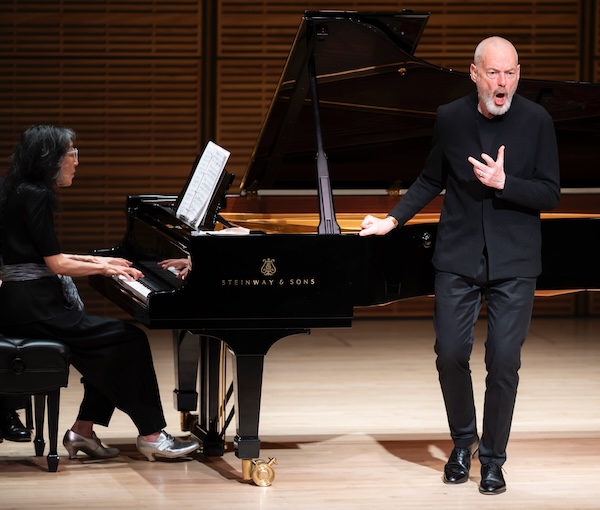Poetry is king in an intimate “Winterreise” with Padmore and Uchida

People new (and not so new) to classical music sometimes ask, “Why do they call it a recital? Nobody recites anything.”
They should come to a recital of Schubert songs by tenor Mark Padmore and pianist Mitsuko Uchida, such as their performance of Winterreise Friday night at Carnegie’s Zankel Hall, and hear how crafting a poem set to music can seem at times more like dramatic recitation than one’s usual idea of singing.
Two years almost to the day since their last outing with Beethoven and late Schubert in Zankel’s relatively intimate space, the two artists picked right up where they left off, only more so—Padmore even more emphasizing speech-like articulation over melodic line, Uchida’s watercolor shadings hovering even more elusively in the background.
Padmore reserved vibrato for only the most anguished or angry moments in the cycle, where it sounded more like ragged shaking than a pretty mini-trill. He even declined to exploit the bait-and-switch of the opening song, “Gute Nacht,” a melodious, prototypically Schubertian prelude to a cycle of fractured, dark musings that mystified the composer’s friends when they first heard it. Stealing in on a soft, colorless high note, the tenor conveyed the lover’s desolation from measure one.
Clear and focused even in the softest passages, Padmore’s high tenor became a scalpel of irony in songs like “Die Wetterfahne,” with Uchida’s piano gently suggesting the shifting winds that spun the weathervane of the lady’s affections.
In general, Uchida declined the role of the assertive pianist sharing the foreground with the singer and driving him to greater heights. And yet her colorful, layered playing was anything but timid. It was as if the singer-protagonist was left alone with his thoughts, and the piano—seemingly hammerless, vibrating on its own in the middle distance–reflected those thoughts in a dark mirror.
“Der Lindenbaum,” with its outwardly simple tune and constant shifts of mood, particularly showcased the duo’s subtle art. Without overemphasis, Uchida noted the difference between summer breezes in the tree’s leaves in the opening bars and the winter wind in its branches at the close. In Padmore’s telling, the death-symbolizing tree was a comforting presence to start with, seductive and a little scary at mid-song, and just one more abandoned hope by the end.
Uchida’s alternating hands fluttered over the keys in “Rückblick” (Backward Glance) while Padmore spat out the rapid text with pinpoint intonation, “So eilt’ ich zu der Stadt hinaus” (Such was my hurry to get out of town). Other animated moments in this tenebrous cycle, while offering necessary contrast, were also necessarily clouded (dashed hopes of a letter in “Die Post” [The Mail]) or elusive (the dancing light in “Täuschung” [Illusion]) or desperate (the forced bravado in “Mut” [Courage]).
Like the wheeling crow of “Die Krähe” or the silent graves of “Das Wirtshaus” (The Inn), the hurdy-gurdy player of the final song “Der Leiermann” was more of a suggestion than an image in Uchida’s piano, not a vivid grotesque but a curious vision in fog. His tinkling tune sounded distant and pearly, and Padmore addressed him in a kind of trance, pianissimo. The artists froze and held the final silence for almost a minute, until a muttered “bravo” broke the spell and appreciative applause welled up.
Carnegie Hall presents pianists Mitsuko Uchida and Jonathan Biss in an all-Schubert program, 8 p.m. April 9. carnegiehall.org